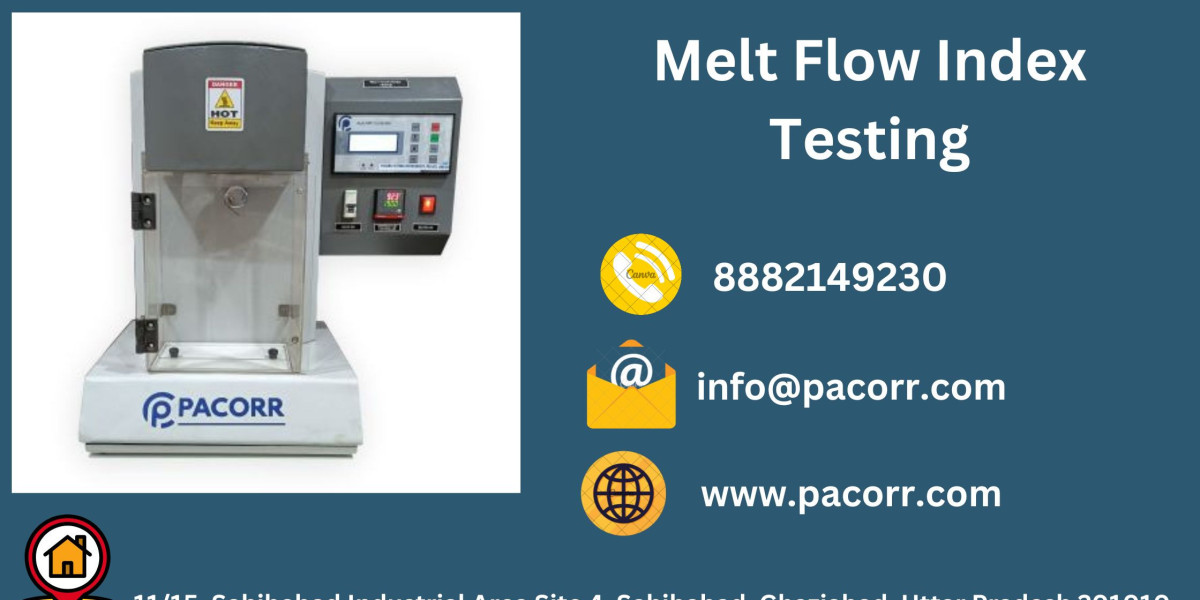The Melt Flow Index Tester (MFI Tester) is an indispensable instrument for manufacturers and researchers in the polymer and plastic industries. This advanced device measures the flow rate of thermoplastic materials under specific conditions, providing vital insights into their quality and performance characteristics. With the increasing demand for precision and consistency in plastic manufacturing, the Melt Flow Index Tester has become a cornerstone for ensuring product excellence.
At Pacorr Testing Instruments Pvt Ltd, the Melt Flow Index Tester is engineered to meet the highest standards of accuracy and reliability, making it a trusted choice for industries worldwide.
What is a Melt Flow Index Tester?
The Melt Flow Index Tester is designed to measure the melt flow rate (MFR) of thermoplastic polymers. MFR is a critical parameter that reflects the material’s viscosity and flow properties when subjected to heat and pressure. This data is essential for evaluating the processing capabilities and end-use performance of polymers.
The test is conducted by extruding a molten polymer through a standard die under controlled conditions of temperature and load. The amount of material extruded in a given time is recorded, providing the melt flow index value in grams per 10 minutes.
Key Features of Pacorr’s Melt Flow Index Tester
1. High Precision and Accuracy
Pacorr’s Melt Flow Index Tester is equipped with advanced sensors and precision components to ensure accurate measurement of melt flow rates, even for challenging polymer samples.
2. User-Friendly Design
The ergonomic design and intuitive controls make Pacorr’s MFI Tester easy to operate, even for beginners. The machine is equipped with a digital display for real-time data monitoring.
3. Compliance with International Standards
The instrument complies with globally recognized standards such as ASTM D1238 and ISO 1133, ensuring that results are reliable and accepted worldwide.
4. Versatility
The MFI Tester is suitable for a wide range of thermoplastic materials, including polyethylene (PE), polypropylene (PP), polystyrene (PS), and more. This versatility makes it ideal for diverse industrial applications.
5. Robust Build
Built with high-quality materials, Pacorr’s MFI Tester is durable and designed to withstand rigorous testing environments.
Why is Melt Flow Index Testing Important?
1. Material Characterization
MFI testing helps manufacturers understand the flow properties of polymers, ensuring they meet specific processing requirements.
2. Quality Control
Regular MFI testing ensures that raw materials are consistent in quality, reducing defects in the final product.
3. Process Optimization
By understanding the melt flow properties, manufacturers can fine-tune their production processes for better efficiency and reduced waste.
4. Compliance with Standards
MFI testing helps manufacturers comply with international quality standards, making their products suitable for global markets.
5. Cost-Effectiveness
Early detection of material inconsistencies through MFI testing can prevent costly production downtime and product recalls.
Applications of Melt Flow Index Tester
The Melt Flow Index Tester is widely used in industries such as:
- Plastic Manufacturing: Ensuring the quality of raw materials like polyethylene, polypropylene, and polystyrene.
- Packaging Industry: Evaluating the properties of films, containers, and other packaging materials.
- Automotive Sector: Testing polymers used in vehicle interiors, exteriors, and functional components.
- Consumer Goods: Assessing the quality of plastic products like household items and electronics.
- Research and Development: Developing new polymer formulations with specific flow properties.
How to Use Pacorr’s Melt Flow Index Tester
Step 1: Prepare the Sample
The polymer sample is cut into uniform granules and preheated to the test temperature.
Step 2: Load the Sample
The material is loaded into the barrel of the MFI Tester, which is preheated to the required temperature.
Step 3: Apply Load
A specified weight is applied to the molten polymer, forcing it through the die.
Step 4: Record Results
The extruded material is collected and weighed to calculate the melt flow index.
Step 5: Analyze Data
The MFI value is used to assess the polymer’s suitability for specific applications.
Benefits of Using Pacorr’s Melt Flow Index Tester
- Enhanced Product Consistency: Achieve uniformity in material properties for better product performance.
- Improved Process Efficiency: Optimize production settings based on precise material data.
- Reduced Material Wastage: Identify unsuitable materials before production to minimize waste.
- Compliance Assurance: Meet stringent quality standards for global market acceptance.
- Cost Savings: Prevent costly errors and ensure long-term reliability of products.
Pacorr’s Commitment to Quality
At Pacorr Testing Instruments Pvt Ltd, we understand the critical role that Melt Flow Index Testers play in ensuring product quality and consistency. Our MFI Testers are designed to deliver accurate, reliable, and repeatable results, empowering manufacturers to meet the highest quality standards. With robust construction and cutting-edge features, Pacorr’s Melt Flow Index Tester is an investment in excellence.
Conclusion
The Melt Flow Index Tester Price is an essential tool for industries that rely on polymers and thermoplastics. From quality control to process optimization, this instrument provides invaluable insights into material behavior. Pacorr Testing Instruments Pvt Ltd offers a state-of-the-art MFI Tester that combines precision, ease of use, and compliance with global standards.






